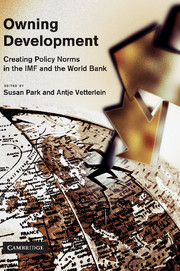Book contents
- Frontmatter
- Contents
- List of figures
- List of tables
- List of contributors
- Preface and acknowledgements
- List of acronyms and abbreviations
- Part One Introduction
- Part Two Norm emergence
- Part Three Norm stabilization
- Part Four Norm subsiding
- Part Five Conclusion
- 11 Do policy norms reconstitute global development?
- Bibliography
- Index
11 - Do policy norms reconstitute global development?
Published online by Cambridge University Press: 02 December 2010
- Frontmatter
- Contents
- List of figures
- List of tables
- List of contributors
- Preface and acknowledgements
- List of acronyms and abbreviations
- Part One Introduction
- Part Two Norm emergence
- Part Three Norm stabilization
- Part Four Norm subsiding
- Part Five Conclusion
- 11 Do policy norms reconstitute global development?
- Bibliography
- Index
Summary
Introduction
The IMF and the World Bank have taken up new ideas and retained old ones in ways which modify their policies and therefore actions, yet how and why they do so remains under-studied. In the introduction (chapter 1) we identified the need for in-depth empirical research investigating why the IMF and the World Bank behave the way they do. We outlined the constructivist parameters for examining how and why the Bretton Woods institutions came to own the policies they currently promote to developing countries. This conclusion draws together the results of the volume in response to the three key aims outlined in the introduction. First, the volume aimed to examine how ideas came to prominence within either the Fund or the Bank which were then translated into globally applicable approaches to economic growth and development, which we call policy norms. Second, the volume aimed to identify the strength of the policy norms currently advocated by the Fund and the Bank. This is important for examining the extent to which policy norms are emerging, stabilizing or declining, the last of which has not received much analytical attention to date. Finally, the volume aimed to identify the sources, triggers and mechanisms that lead to the formation and change of policy norms within these IOs. We analyse whether the processes inherent in the norm circle of policy norm development help us understand IO change and broader shifts within international economic growth and development.
- Type
- Chapter
- Information
- Owning DevelopmentCreating Policy Norms in the IMF and the World Bank, pp. 225 - 247Publisher: Cambridge University PressPrint publication year: 2010
- 2
- Cited by



